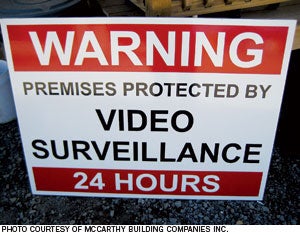Hospitals fight construction site thefts
 For many Americans, tough times are still here, so some have turned to commodities to make an income. But these are not the kind you buy and sell on the trading floor. Instead, they're stealing these commodities — and anything else they can get their hands on — from construction sites, including where new hospitals are being built or expanded.
For many Americans, tough times are still here, so some have turned to commodities to make an income. But these are not the kind you buy and sell on the trading floor. Instead, they're stealing these commodities — and anything else they can get their hands on — from construction sites, including where new hospitals are being built or expanded.
For example, copper coils were ripped out of six air-conditioning units at the Veterans Affairs Hospital construction site in Cape Coral, Fla., in August. The power to surveillance cameras had been turned off, police say. The cost to replace the units was estimated at about $29,000.
In September thieves tried to take about $90,000 worth of copper wire from a construction site at Grand View Hospital in Sellersville, Pa. A hospital employee reportedly called police to the hospital parking lot after seeing three men run from a pickup truck. Six rolls of wire valued at $15,000 each that had been taken from a construction warehouse were found on hospital property.
"We're seeing incidents of thefts at construction sites across the country, especially thefts of tools and commodities like metals," says Steve Van Dyke, project director in the San Diego office of McCarthy Building Companies Inc.'s health care business unit. "That seems to be a pretty consistent thing."
Copper consistently commands a good price at the recycling yard and it's available at almost every construction site. Last month No. 1 heavy scrap copper was selling for about $3 a pound and, at the lower end of the pricing scale, copper/aluminum rad scrap was selling for a little more than $1 per pound, according to one metal recycling website.
Andy Davis, a project executive with New York-based Turner Construction Co. who works out of the firm's Nashville, Tenn., office, says his company has experienced few thefts of any major consequence over the past several years. The company maintains well-secured construction sites that frequently include surveillance cameras, fencing and other barriers and sometimes on-site security personnel, he says.
Thefts of tools by workers on a project were fairly common at McCarthy's sites at one time, but the company has taken steps to minimize it by keeping closer inventory of tools that are issued. Turner keeps tool thefts to a minimum through its rigorous screening of workers before they're hired for a project, says Davis.
Tom Smith, CHPA, CPP, director of hospital police and transportation at the University of North Carolina Hospitals, knows a few things about construction site security. The hospital has undertaken an estimated $700 million in new construction during Smith's nearly 20 years at UNC.
He agrees that maintaining high standards for hiring workers and taking other fundamental communication and logistics-oriented steps can minimize theft. Smith recommends:
• Establishing rules on who is responsible for construction site security and safety, and developing an early relationship with local police or campus public safety;
• Setting rules for site hours of operation and access;
• Providing space for contractors to secure their materials and equipment;
• Constructing security features, such as cameras, as early as possible, and leaving fencing or other barriers in place as long as possible;
• Considering security needs for the phase just before opening the building.
"This is a very precarious time for security and safety," Smith says.




